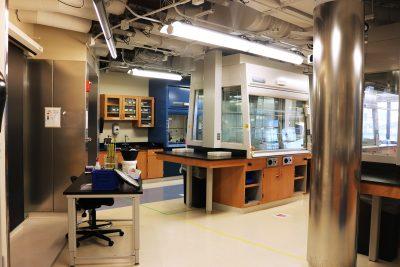It’s no secret that students of all backgrounds have been facing difficulties with remote learning. STEM majors, with limited hands-on practice in laboratories, are no exception.

James Bird, an associate professor in Boston University’s College of Engineering, said although professors are doing the best they can, it is still crucial they teach students the tools necessary for them to advance to higher-level classes.
“I’m, as I think the rest of my colleagues are, doing our absolute best to make sure that overall expectations are the same,” Bird said. “The classes are a prerequisite for follow on classes, and it’s important for the students to have that same material and the same level of understanding that they can.”
One difference in teaching during the pandemic has been navigating hybrid learning while students are in different time zones, he added, and trying to accommodate all of his learners is a logistical challenge.
“Most of [the students] are not in person, and some of them are halfway around the world,” Bird said. “There’s a bit more onus on them to be able to keep up with the material, even if their internet connections aren’t as good.”
Since the Learn from Anywhere model took effect, Bird said students now usually complete labs and projects alone because coordinating groups can be difficult.
“I encourage students to collaborate together, but each student has to do the experiment on their own,” he said. “For those that don’t know someone in the classroom or aren’t able to collaborate in this way, I think it’s more isolating and I’m definitely aware of that.”
Leon Zhou, a sophomore in the College of Arts and Sciences studying computer science, said the lack of direct access to professors and classmates has made for a stressful learning environment.
“We used to have office hours really easy to access,” Zhou said. “Now it’s just impossible.”
In past semesters, Zhou said he could walk right into the computer science lab and ask the teaching assistants for help easily, but Zoom does not offer the same convenience.
“It’s very, very scattered, it’s very unorganized,” Zhou said. “You go into the Zoom, and then you have to wait for like an hour for an actual person to talk to you because people are so occupied … we’re just waiting in breakout rooms.”
Zhou also said the remote learning model has made it almost impossible to find other students to collaborate with.
“When you’re in office hours, when everything’s in person, you can meet a lot of friends, and then you can discuss the problem, even when the TA is not available,” Zhou said. “Now, it’s just really hard. All you have is a group chat.”
These impacts, Zhou said, not only affected his experience in the class, but his grades and overall work ethic.
“Last semester was pretty bad,” Zhou said. “Especially in STEM, when everything is online, the learning experience is impacted.”
For Abby Hagen, a CAS sophomore studying marine science, the remote learning experience simply makes the coursework more difficult because she must conduct all of her experiments alone.
“When we went remote last Spring, all of our labs transitioned online and it was kind of frustrating because everything was virtual,” Hagen said. “We were just being given datasets and being told to write lab reports on things that we never actually did.”
Hagen also said the workload, if anything, has increased due to the remote learning.
“The bottom line is we were doing just the same amount of work, if not more work, to compensate for not being in the labs while not gaining any practical, hands-on experience,” Hagen said.
Right now, Hagen’s chemistry course assigns more work, mostly around interpreting data sets, she said.
“We need to learn those practical skills,” she said, “but we’re not getting any hands-on experience, so I don’t really know how that stuff will translate post graduation.”
While she doesn’t have more coursework now than she has in semesters past, Hagen said work is distributed less in class, meaning it’s up to students to complete it independently.
“While we’re in class, it’s more like our professors or our TAs giving us brief overviews of things and then us, on our free time, doing more work,” she said. “It’s kind of unfortunate.”
To combat these issues, Zhou said professors and teaching assistants could make themselves more available to students over Zoom.
“Definitely offer more help,” he said. “If in-person office hours is possible, I’d really prefer that, but if not, then increase more time, seriously, increase more time and more help in office hours.”


























































































































